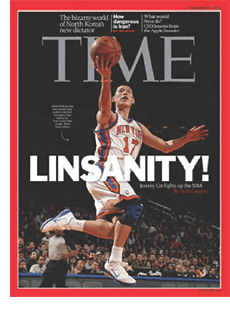
Mindshare POV, by Mindshare Shanghai
The last month has seen an unknown bench-warmer of the New York Knicks basketball team Harvard graduate Jeremy Lin propelled into the upper echelons of auspicious notoriety. Mr Lin wrote his name in the history books by delivering more points during his first five games as a starter than any of the greats who had gone before him. From this unlikely scenario, Mr Lin has garnered a global spotlight with his own lexicon and, despite a gap of 6 NBA championships and s MVPs, his face has appeared on Time Magazine the same number of times as Michael Jordan's.
Clearly something remarkable has happened beyond the accomplishments of a regular NBA player. Many consider the halo topic to be Mr Lin's ethnicity. In reality, however, the question is one of nationality. Taiwanese media are celebrating a local hero. Sports mega-structure ESPN broadcast every Knicks game live to their subscribers, and free-to-air picks up all highlights. Deep into the city ofTaipei, 'Linsanity' t-shirts hang proudly alongside designs celebrating Taiwan's other gems such as Taipei 101.
In case human t-shirts are not enough, Taipei's famous night markets also offer imitation Lin jerseys designed for canine fans.

During a recent visit, your correspondent even saw local convenience-store owners in Taipei group around television sets behind their counters to watch a national news feature about a Jeremy Lin look-a-like who, owing to the higher earning potential, quit his job so that he could profit from his good fortune by cutting ribbons to open super-markets. It is unclear if Mr Lin benefits from his doppelganger's franchise. Meanwhile, across the Strait of Taiwan, some mainland Chinese had, until recently, been claiming an adopted son.
Mr Lin's on-court success has helped the NBA put pressure on Chinese national media giant CCTV to broadcast Knicks games live to their billion-strong audience. In Chinese language social media, Mr Lin's Sina Weibo account has grown from a respectable 1oo,ooo followers to a beefy 2 million. Sina Sports, a portal service not dissimilar to Yahoo and part of the Sin a group that owns Sina Weibo, have an exclusive content deal with the NBA in China that sees content sharing between the NBA and Weibo. Excitement around a particular player will fuel excitement for the league. Linsanity has contagious benefits, of which the NBA is a principle recipient.
As a 6-ft 3 Asian-American - or American-Asian, if you please and a graduate of an Ivy League school, Mr Lin's chosen career path is unconventional compared with the NBA's most recent star of Chinese descent, 7ft-6 Yao Ming, who retired from the profession during the off-season to much fanfare and reverence in China. As a boy, Mr Yao was raised to play basketball; both his parents represented the Chinese national teams. The matrimony of 6ft 7 Yao Zhiyuan and 6ft 3 in Fang Fengdi produced, at the time, the NBA's tallest player. Today, Yao Ming is among the world's 25 tallest living people.
Contrastingly, Mr Lin was born and raised in the United States; his family emigrated to Taiwan around the time of the 1949 Communist Revolution. Without dwelling on the historical relations between Taiwan and Mainland China, it is suffice to say that Mr Lin's Chinese nationality is, at best, questionable. Indeed, were Mr Lin to have been born in China and raised through the Chinese sports system, it is unlikely that his parents - to whom Mr Lin would have been an only son - would have actively encouraged a career to which the country's sports system would have deemed him too vertically-challenged to compete with 'born specimens' like Mr Yao. Nor would Mr Lin's religious disposition be allowed to blossom as it evidently has in the United States; what the American-born Mr Lin sees as a "miracle from God", the Chinese-born Mr Lin would be expected to honor to the nation. To some degree, Mr Lin has been able to achieve what he has for the very reason that he is not Chinese. Therein lies the problem.
While Linsanity is practically epidemic in Taiwan, in China the bubble has been prematurely burst. On February 18th, Mr Lin's grandmother appeared on television rebuking Chinese fans for claiming her grandson as their own. Ironically, the video, and the message it contained, quickly spread on Sina Weibo, the preferred Chinese language micro-blog among Taiwanese users and East-coast Mainland China users alike, and the NBA's main social media outlet in China.
Since then, Patriotic enthusiasm from China directed towards Mr Lin has waned. Chinese Weibo users were less than impressed with the snub, and those from mainland China who had previously celebrated Mr Lin's success as a derivative of their own are now too embarrassed to do so.
Search volume for both Google and Baidu has fallen dramatically. Insights gleaned from Baidu's Index tool - the equivalent to Google's Insights - reveals that searches relating to Mr Lin are now much more to do with his tactical positioning within the team, or results of a particular game, than they are to the hype surrounding his past escapades.
Following such unprecedented hype, Mr Lin's subsequent NBA performances inevitably underwhelmed. Opponents learnt how to deal with his style of play, and the standing ovation returned their bums to their seats in an expression of calm appreciation. Back in Taipei, book stores maintain their stocks of Lincredible, the biographical almanac perhaps more astounding for the rapidity of its creation than the insights of its content. Hedging the hype, the unit price has tumbled to 21% off original price. At the current rate, by June the books will be free. In New York, after a sharp spike around the time of Mr Lin's rise to fame, stock price for Madison Square Garden Co. has steadied; while no longer rising, it is still outperforming the NASDAQ by 1o%pts. Amazingly, there is even talk among sports writers in The New York Times of Mr Lin returning to the bench of which he had, but one month ago, been so inconspicuously accustomed. It seems the world has been guilty of a certain temporary Linsanity.
Stock prices, dog-jerseys, and books aside, Mr Lin's impact on basketball will be resoundingly positive as basketball challenges football as the world's most internationally-represented sport. In August 2011, Wuxi Risheng Sports Utility Co. registered Mr Lin's name as a trademark for the paltry sum of USD 710. Today, Forbes estimates Mr Lin's brand to be worth USD 15million, albeit a somewhat arbitrary calculation. Whether his team lins or loses, Mr Lin has undoubtedly become red hot marketing real-estate; but brands eyeing a short-cut to building equity among mainland-Chinese should think twice before looking for Jeremy Lin to solve their problems.